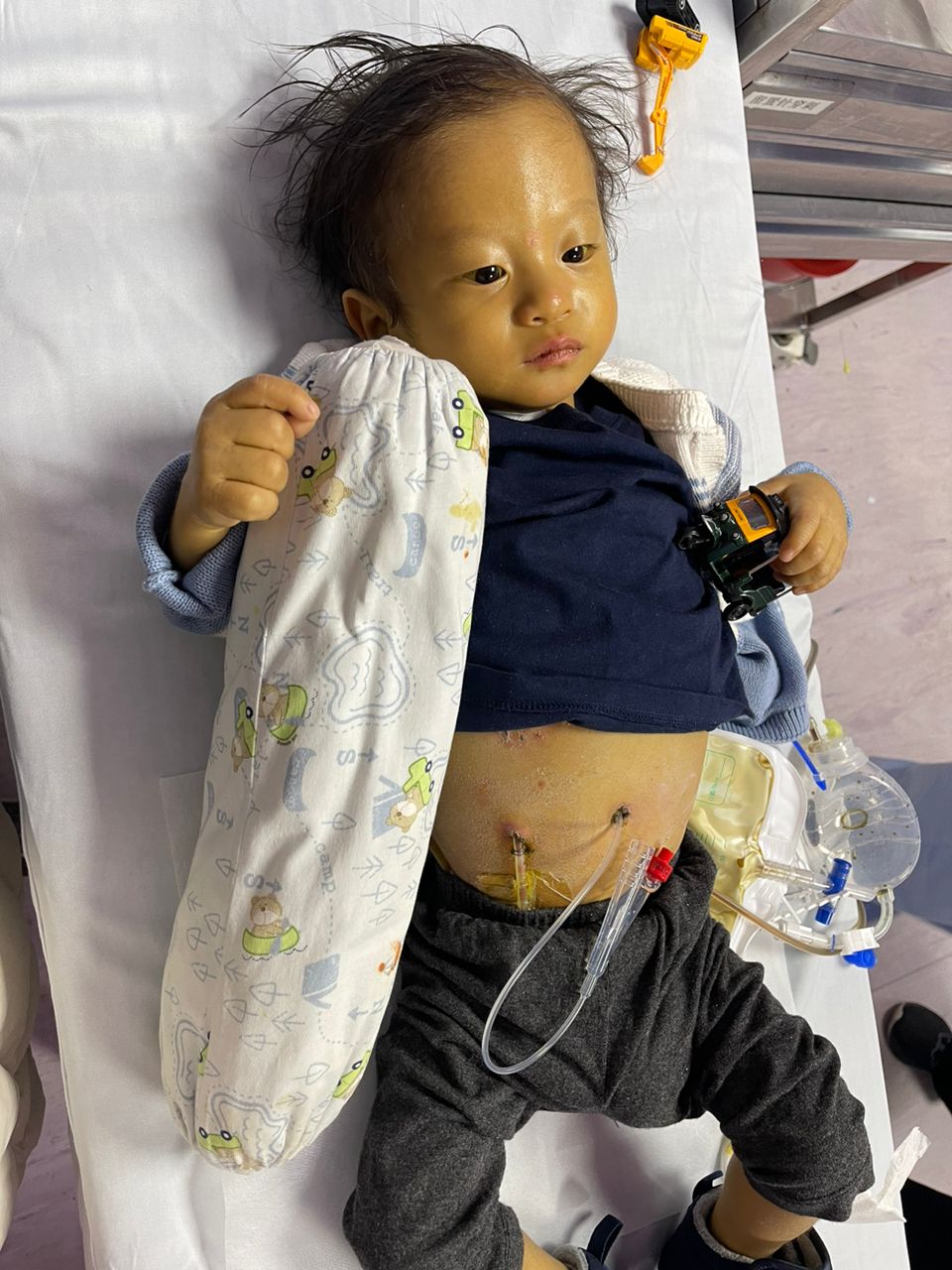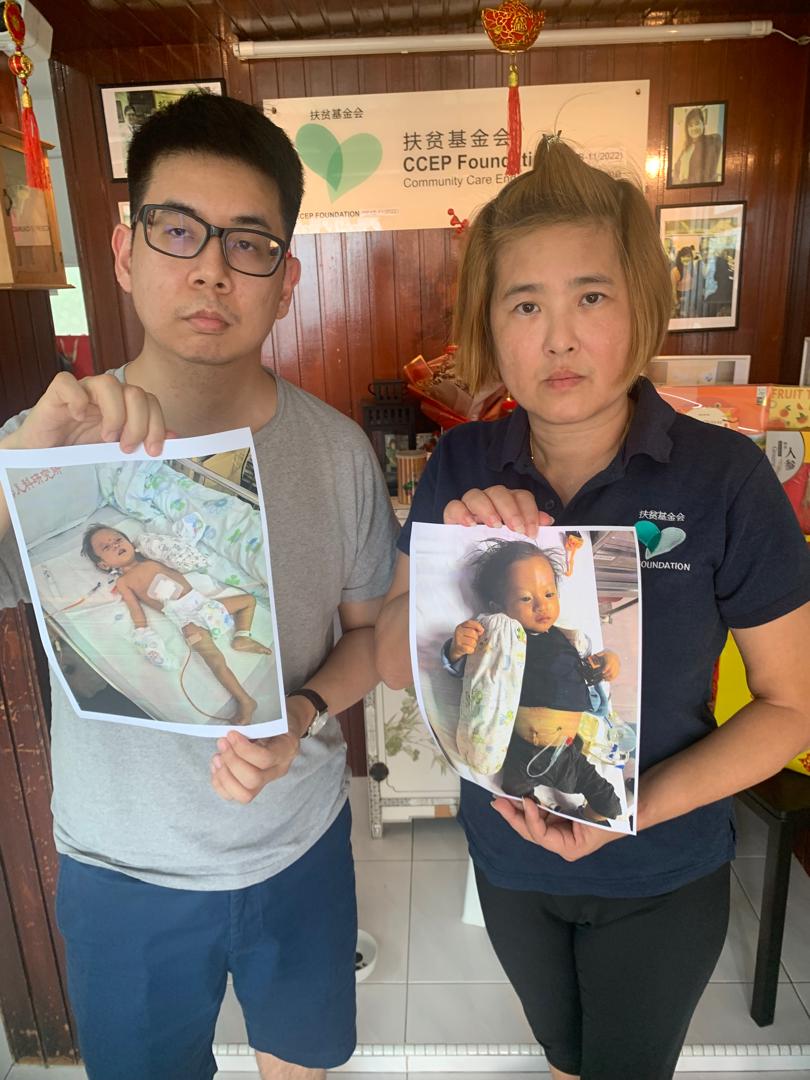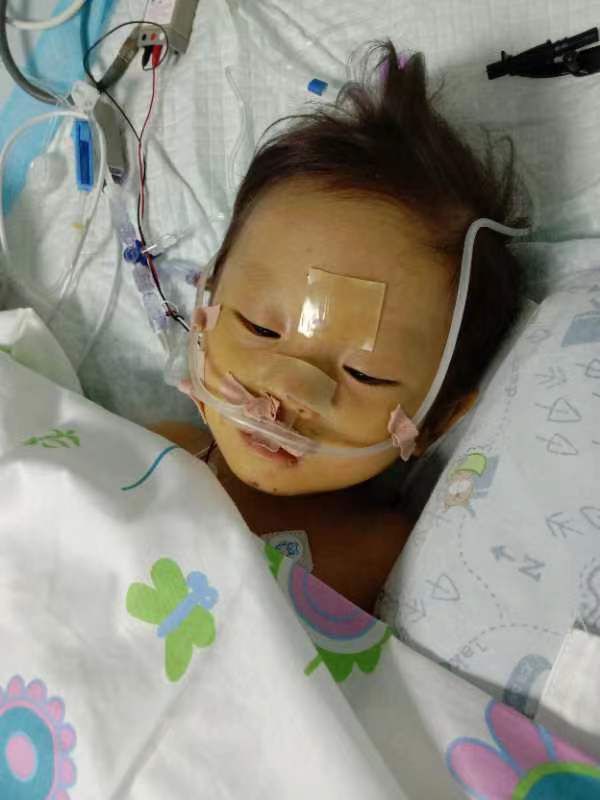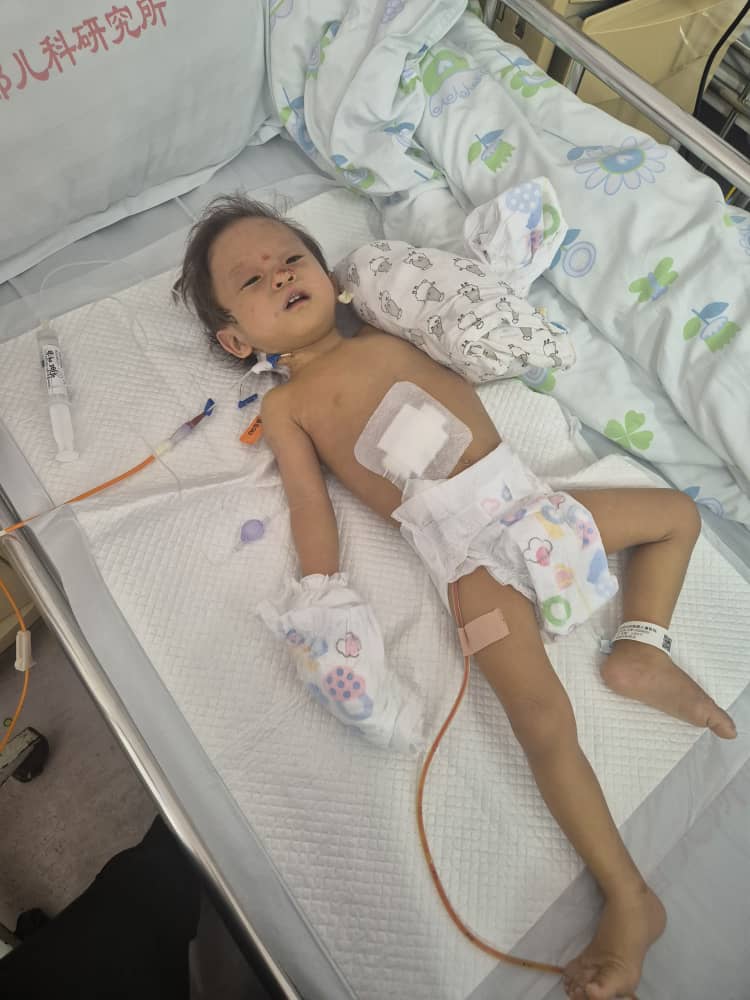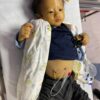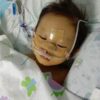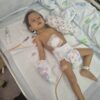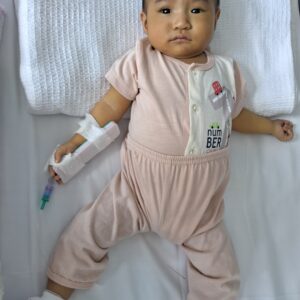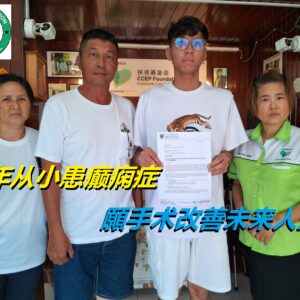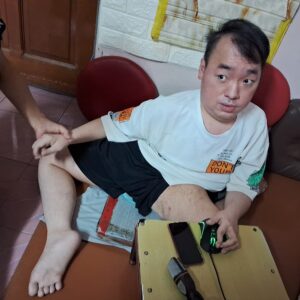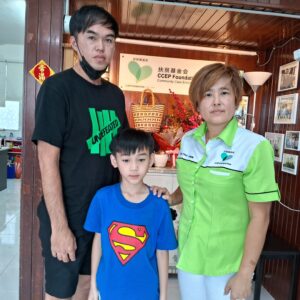Description
~款项筹足~ [已停止接受捐款]
(吉隆坡1日讯)2岁男童 沈嘉乐患上罕见遗传性疾病——第一型 进行性家族性肝内胆汁淤积症(Progressive Familial Intrahepatic Cholestasis Type 1,简称PFIC1)急需8万令吉急救,必须在3个月内施手术延续生命。
父亲 沈卓栋(35岁,经理)说,孩子出生后,发现他的身上出现一些黄疸,但没有接受光照治疗,以为没有事情,岂知,出世后的3个月,他的眼睛和皮肤开始发黄,于是 载他去医院检查,包括超声波扫描检查、HIDA扫描(胆道闪烁显像或肝胆闪烁显像),初步怀疑是胆道闭锁。
“后来经过胆道造影观察胆道系统是否有病变,很明显这不是胆道闭锁,医生说不需要动手术,只需继续观察。当时一些淤积的胆汁被抽出后,以为一切都处理好了,过后,孩子继续出现黄疸,他的身体越来越黄,也越来越痒。”
“几个月后,我们去别一间医院复诊,医护人员为孩子做了几项检查,他们怀疑孩子患上PFIC,他们抽孩子的血液寄去国外进行基因检查,他被诊断PFIC1,过后我和太太同时被抽血检验出我们都是疾病携带者。”
他表示,医生说当被诊断这种疾病时,是没有治疗方式的,只能通过药物“管理“症状,有可能需要肝脏移植。孩子的疾病是属于第一型的疾病,所以进展会非常缓慢。我们希望可以延缓进行肝脏移植,我们会先以医药来控制孩子的疾病症状。
他说,在欧美国家,是允许使用Maralixibat药物处理孩子状况,正常价格为每瓶 53.6 千美元(238千令吉)。以他的儿子情况来说,一瓶可以使用一个月,这要根据孩子的体重来衡量,如果孩子的身高和体重不断增加,费用会越来越高。在美国、英国和欧洲,患者的费用部分或全部由私人保险、社会保险或政府承担。但在马来西亚,并没有这种保障。
“通过医生跟该药物公司商量后,他们同情儿子的情况,于是免费提供给我们,但我们必须前往新加坡进行治疗。尝试了 6 个月后,虽然它对儿子的瘙痒有所缓解,但效果有限。”
“他的病情导致胆汁滞留在肝脏中,使他经常出现黄疸和瘙痒。此外,他还面临脂溶性维生素(维生素 A、D、E 和 K)缺乏的高风险,因此,孩子没有办法正常成长。因此,我们必须特别为他补充这些维生素。”
他说,让孩子感到最难受的就是体内瘙痒问题,一旦痕痒就会让他不停哭泣,这个问题导致孩子没有办法好好入睡,很多时候都在抓挠,导致皮肤流血,出现很多疤痕,尤其遇到潮湿又闷热天气,他一感受人就会痕痒,会让他感到不舒服和生气。
“孩子需要饮用一种特殊配方奶,其含有 50% MCT(中链甘油三酯),这种脂肪帮助他更容易被消化和吸收。对于普通人来说,我们的日常饮食通常以 LCT(长链甘油三酯)为主,但这种类型的脂肪对他来说更难消化。”
他表示,在大马和新加坡暂时没有医生懂得为这个疾病施手术,后来,他们接触到中国医护人员有这方面经验,于是把孩子送去中国尝试手术——内胆汁分流术(Partial Internal Biliary Diversion),其目的是减少或中断胆汁重新进入血液循环。对于正常人来说,约 95% 的胆汁会被重新吸收循环,但由于患者肝脏内的胆汁淤积过多且无法正常排出,希望通过这种手术减少胆汁的再循环来帮助改善孩子的病情。
“去年圣诞节之前,我们带孩子去中国北京施手术,术后1个星期,他的身体出现一些并发症,必须进行第二个手术,术后还是不稳定,两个星期在重症加强护理病房尝试使用不同药物治疗,甚至咨询其他医生的意见,最后的决定是需要肝脏移植。之前已经尝试了所有方法,这是最后的方法了。”
“他们建议我们去中国上海仁济医院,就进行肝脏移植评估和检查,2个月后会带孩子去中国进行手术,我会捐肝给他。”
“在发现他的黄疸没有好转,并确认不是胆道闭锁后,医生告诉我们一些可能的情况。我们希望不是PFIC,因为我们寻找资料时发现PFIC是最严重的,最终他被确诊患上这种疾病时,我们感到非常绝望。虽然一开始很难接受,但我们决定尽可能让他过上正常生活。”
CCEP首席执行长余宝橒表示,小嘉乐患的病是隐性基因遗传病,是没有药物可治疗的,他是属于异常性染色体隐性遗传性疾病,唯一可以做的就是接受肝脏移植手术。
“目前他的病情是:胆红素指数非常的不正常、全身顽固性瘙痒得难受、胆汁淤积性黄疸、肚子因蛋白质含量高导致腹水肿胀、肝纤维化,肝硬化,肝衰竭,其症状与胆道闭锁相似。”
“目前已经做过两次手术——内胆汁分流术,目前情况暂时可以缓解。”
她解释,孩子的双亲已经花了10万令吉,现在突然需要一笔钱来治疗孩子,由于手头现金有限,让他们吃紧,所以不得不求助CCEP
她说,PFIC1是一种罕见疾病,孩子的双亲之前一直找不到病因,在本地暂时没有这方面的技术。孩子接受手术后,后续的经费是很高的,他必须持续接受观察和服用很多药物。
“目前虽然小嘉乐的病情没有恶化,但是这是暂时性,所以我们需要尽快筹足医药费,让他提早完成手术。”
A 2-year-old boy, Caleb Sim, has been diagnosed with a rare genetic disorder—Progressive Familial Intrahepatic Cholestasis Type 1 (PFIC1). He urgently needs RM80,000 for life-saving surgery within three months.
His father, Sim Chiuo Tung (35 years old, manager), shared that after birth, his son exhibited some jaundice but did not receive phototherapy, as they assumed it was not serious. However, three months later, his eyes and skin turned yellow, prompting them to take him to the hospital for examinations, including an ultrasound and a HIDA scan (hepatobiliary scintigraphy). Initially, doctors suspected biliary atresia.
“Later, a cholangiography was performed to check for any abnormalities in the bile ducts, confirming that it was not biliary atresia. The doctors said surgery was unnecessary and advised continued monitoring. At that time, some of the accumulated bile was drained, and we thought the issue was resolved. However, his jaundice persisted, his skin became even more yellow, and he started experiencing severe itching.”
“A few months later, we sought a second opinion at another hospital, where doctors suspected PFIC. They took a blood sample from our child and sent it overseas for genetic testing. The results confirmed PFIC1 and further testing showed that both my wife and I are carriers of this genetic disorder.”
The doctors explained that there is no cure for this disease, and the only option is to manage the symptoms with medication, with a possible need for a liver transplant. Since PFIC1 progresses very slowly, they hope to delay the transplant and control the symptoms with medical treatment for as long as possible.
In Western countries, the drug Maralixibat is used to manage this condition, costing USD 53.6K (approximately RM238K) per bottle, which lasts about a month depending on the child’s weight. As he grows, the required dosage and cost will increase. In countries like the US, UK, and Europe, part or all of the expenses are covered by private insurance, social security, or government aid. However, Malaysia lacks such financial support.
“After discussions between our doctor and the pharmaceutical company, they sympathized with our son’s condition and agreed to provide the medication for free. However, we must travel to Singapore for treatment. After trying it for six months, the medication provided some relief from itching, but the overall effect was limited.”
His condition causes bile to accumulate in the liver, leading to persistent jaundice and itching. Additionally, he is at high risk of fat-soluble vitamin deficiencies (Vitamins A, D, E, and K), which affect his growth. As a result, he requires special vitamin supplements.
“The most distressing symptom for him is the relentless itching. When it flares up, he cries uncontrollably and struggles to sleep. He scratches so much that his skin bleeds and scars form. The condition worsens in hot and humid weather, making him extremely uncomfortable and irritable.”
“Our child requires a special formula milk containing 50% medium-chain triglycerides (MCT), which are easier to digest and absorb. Normal diets primarily contain long-chain triglycerides (LCT), which are more difficult for him to process.”
Since no doctors in Malaysia or Singapore specialize in this surgery, they sought medical help in China, where doctors had experience treating this condition. Their child underwent Partial Internal Biliary Diversion (PIBD) surgery in China to reduce bile recirculation into the bloodstream. Normally, 95% of bile is reabsorbed and recycled, but for PFIC patients, excessive bile accumulation in the liver leads to severe complications. The goal of the surgery was to reduce bile recirculation and improve his condition.
“Before Christmas last year, we took him to Beijing for the surgery. A week after the operation, he developed complications and required a second surgery. However, his condition remained unstable. He spent two weeks in the ICU receiving various treatments and consulting multiple doctors. In the end, the final decision was that a liver transplant was the only remaining option.”
“The doctors advised us to take him to Renji Hospital in Shanghai for liver transplant evaluation and tests. In two months, we will take him to China for the procedure, and I will donate part of my liver to him.”
“When we first noticed his persistent jaundice and ruled out biliary atresia, doctors warned us about possible conditions. We hoped it wasn’t PFIC, as research showed it was one of the most severe liver disorders. When the diagnosis was confirmed, we were devastated. It was hard to accept initially, but we decided to do everything we could to give him a normal life.”
The CCEP Foundation CEO Yvonne Yee stated that little Caleb’s illness is a recessive genetic disorder with no available cure. It is an autosomal recessive genetic disease, and the only viable treatment is a liver transplant.
“His current condition includes abnormally high bilirubin levels, severe persistent itching, cholestatic jaundice, abdominal swelling due to high protein levels (ascites), liver fibrosis, cirrhosis, and liver failure, all of which resemble biliary atresia.”
“He has already undergone two surgeries (Partial Internal Biliary Diversion), which have temporarily alleviated his symptoms.”
She explained that the parents have spent RM100,000 on medical expenses so far. Now, they urgently need additional funds for their child’s treatment. Due to financial constraints, they have no choice but to seek help from The CCEP.
She emphasized that PFIC1 is a sporadic disease. The parents struggled for a long time to identify the cause, and currently, there is no specialized treatment available in Malaysia. Even after surgery, ongoing medical expenses will remain high, as the child will require continuous monitoring and lifelong medication.
“Although little Caleb’s condition has not deteriorated further, this stability is only temporary. We must raise the necessary medical funds as soon as possible to ensure he can undergo the liver transplant at the earliest opportunity.”
Those who are interested in donating can deposit their donation directly into the following account:
Bank A/C: CCEP FOUNDATION – RHB 26219300009342
Donation Please note: Caleb Sim
Office number: 03-7955 9999 / 010-2798849
If u need a receipt pls WhatsApp us the Transaction details:https://wa.link/tzmmgy
TAX EXEMPTION RECEIPT FORM:- https://forms.gle/jtBWVNUgxxWZJgzp6






